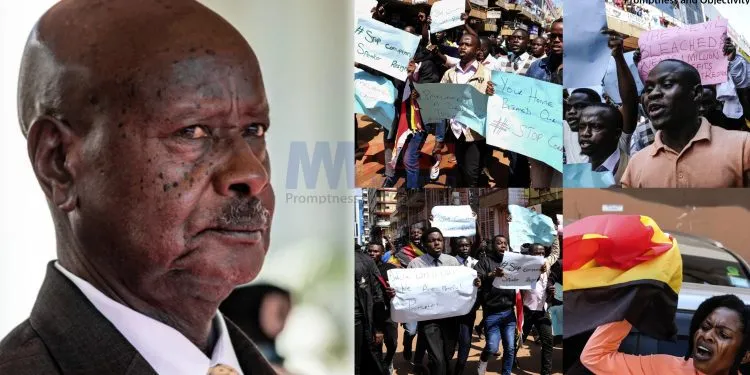KAMPALA, Uganda — Ugandan security forces detained dozens of young people on Tuesday during a banned protest rally in downtown Kampala, according to a rights group. The demonstrators were rallying against official corruption and alleged human rights abuses by the country’s rulers.
A Reuters witness observed the detentions, while a video posted by NTV Uganda on the X social media platform showed police intercepting and detaining a small group of protesters. The demonstrators waved placards and shouted slogans denouncing corruption, with one protester wearing a T-shirt emblazoned with “Speaker Must Resign.”
Chapter Four, a Ugandan human rights group offering legal services to the detainees, reported that at least 45 people were detained during the crackdown. A police spokesperson was not immediately available to confirm the number of detentions.
Five of the detained individuals have been charged and remanded in custody until July 30. They face accusations of being a “common nuisance” and “idle and disorderly,” according to a charge sheet seen by Reuters.
Authorities had banned the protest, citing intelligence that suggested criminally-minded youths might hijack the rally to loot and vandalise. In response, soldiers and police were deployed around the parliament building and the centre of Kampala to deter protesters. All roads to the parliament were blocked off, allowing only lawmakers and parliamentary staff access. NTV Uganda images showed military-armoured personnel carriers patrolling the area.
Businesses near parliament were disrupted by the heavy security presence. “It’s like a war zone,” Edwin Mugisha, who works in Kampala, told Reuters, referring to the military patrols.
On Monday, police sealed off the offices of Uganda’s largest opposition party, accusing it of mobilising for the protests, and detained some party officials, including its lawmakers. The party denied organising the march but expressed support for it.
Opposition leaders and rights activists claim that embezzlement and misuse of government funds are rampant in Uganda. They have long accused President Yoweri Museveni of failing to prosecute corrupt senior officials who are politically loyal or related to him. Museveni, who has been in power since 1986, has repeatedly denied condoning corruption and insists that culprits are prosecuted whenever there is sufficient evidence.
The protests were inspired by recent events in neighboring Kenya, where demonstrations led to the president dismissing almost his entire cabinet following widespread opposition to a proposal for new taxes. Ugandans have been incensed by mounting allegations of corruption against Parliament Speaker Anita Among, who has rejected calls for her resignation despite revelations of allegedly irregular expenditures by her office and associates.
Among, a senior member of Uganda’s ruling party, has been sanctioned by the U.S. and the U.K. She denies any wrongdoing and claims she is being unfairly targeted in a country where corruption is pervasive among officials. Among is currently under an official probe into the source of her wealth and charges of misusing parliamentary resources.
President Museveni, known for his authoritarian rule, has called the street protests intolerable and warned organisers in a televised address that they were “playing with fire.” His government has been repeatedly accused of shielding influential but corrupt officials from prosecution. Despite promising to crack down on corruption after his reelection to a sixth term in 2021, many Ugandans remain sceptical.
Local media frequently report on corruption issues, but activists and opposition figures who attempt to stage demonstrations often face arrest under a law requiring them to notify police of their plans to rally.



